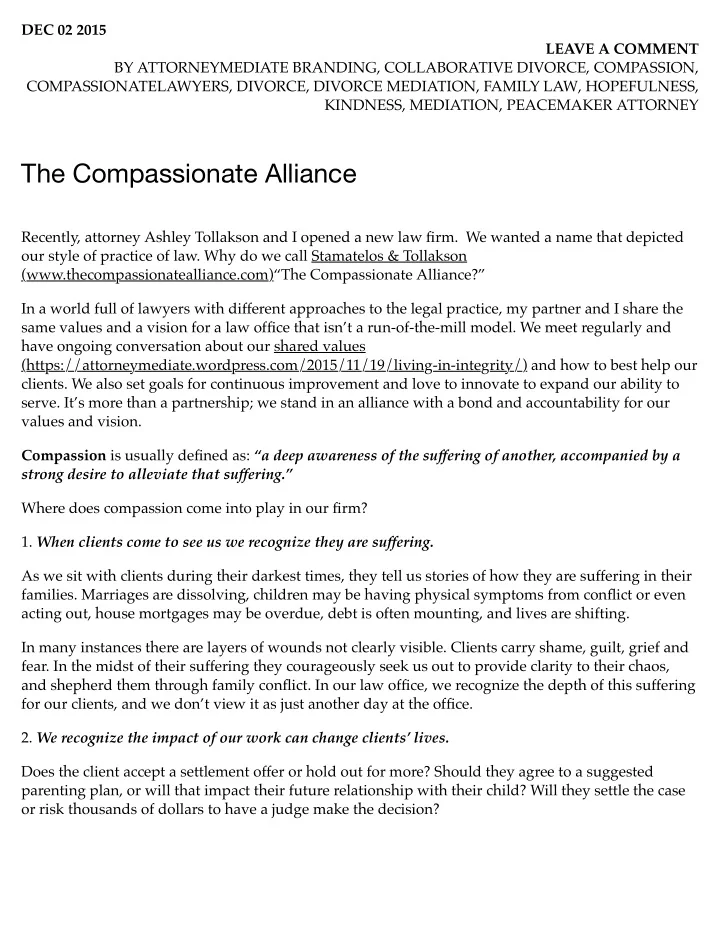

DEC 02 2015 LEAVE A COMMENT BY ATTORNEYMEDIATE BRANDING, COLLABORATIVE DIVORCE, COMPASSION, COMPASSIONATELAWYERS, DIVORCE, DIVORCE MEDIATION, FAMILY LAW, HOPEFULNESS, KINDNESS, MEDIATION, PEACEMAKER ATTORNEY The Compassionate Alliance Recently, attorney Ashley Tollakson and I opened a new law firm. We wanted a name that depicted our style of practice of law. Why do we call Stamatelos & Tollakson (www.thecompassionatealliance.com)“The Compassionate Alliance?” In a world full of lawyers with different approaches to the legal practice, my partner and I share the same values and a vision for a law office that isn’t a run-of-the-mill model. We meet regularly and have ongoing conversation about our shared values (https://attorneymediate.wordpress.com/2015/11/19/living-in-integrity/) and how to best help our clients. We also set goals for continuous improvement and love to innovate to expand our ability to serve. It’s more than a partnership; we stand in an alliance with a bond and accountability for our values and vision. Compassion is usually defined as: “a deep awareness of the suffering of another, accompanied by a strong desire to alleviate that suffering.” Where does compassion come into play in our firm? 1. When clients come to see us we recognize they are suffering. As we sit with clients during their darkest times, they tell us stories of how they are suffering in their families. Marriages are dissolving, children may be having physical symptoms from conflict or even acting out, house mortgages may be overdue, debt is often mounting, and lives are shifting. In many instances there are layers of wounds not clearly visible. Clients carry shame, guilt, grief and fear. In the midst of their suffering they courageously seek us out to provide clarity to their chaos, and shepherd them through family conflict. In our law office, we recognize the depth of this suffering for our clients, and we don’t view it as just another day at the office. 2. We recognize the impact of our work can change clients’ lives. Does the client accept a settlement offer or hold out for more? Should they agree to a suggested parenting plan, or will that impact their future relationship with their child? Will they settle the case or risk thousands of dollars to have a judge make the decision?
As lawyers we help alleviate clients’ suffering by using our intelligence, experience, wisdom and skill. We know the outcome of our work literally puts our client on one life trajectory or another. We take our work seriously and make decisions by working with our client as a strong team. We bring in experts from other disciplines such as finance, mental health or child development, if we believe additional insight would guide us to better decisions. 3. Most clients don’t want to swordfight in the coliseum when they are suffering. We have been trained in courtroom tactics and we have extensive trial experience. Yet statistically, only a small number of cases actually go to trial, and most clients shudder at the thought. Going to court and turning over the outcome to someone who only hears parts of the story, spending large amounts of money on legal fees, and being publicly humiliated can re-wound our client. So can an uncaring or rude opposing lawyer who minimizes our client in front of everyone in the courtroom. Instead, we put ourselves in the client’s chair, and rather than preparing from day one to go to war we pursue peacemaking efforts. We develop a strategy for conflict resolution through the most peaceful and least expensive path available. We view one of our most important roles to be a wise guide walking alongside clients and keeping them thinking clearly. 4. Lawyers acting as peacemakers must exude leadership, firmness and wisdom. Being compassionate doesn’t mean being a push over. When did it become a sign of weakness to care about our fellow human being and to try to keep families from further pain and humiliation? In dispensing compassion we use many important skills including negotiation, mediation, collaborative law, creative problem solving, conscious contracting, coaching and listening. We help our client identify what they really need even if they are unclear themselves. This is not the work of wimps or people who want to “hug it out.” We are grateful to be able to practice law in a way that is authentic for us, and to help clients and their families in ways that move them forward.
Occasionally, some of your visitors may see an advertisement here About these ads (http://wordpress.com/about-these-ads/) You can hide these ads completely by upgrading to one of our paid plans. UPGRADE NOW (HTTP://WORDPRESS.COM/REMOVE-ADS/?UTM_CAMPAIGN=REMOVEADSNOTIVE) DISMISS MESSAGE Tagged Compassion, Divorce, Divorce Recovery, Family Law Create a free website or blog at WordPress.com. | The Chunk Theme.
Recommend
More recommend